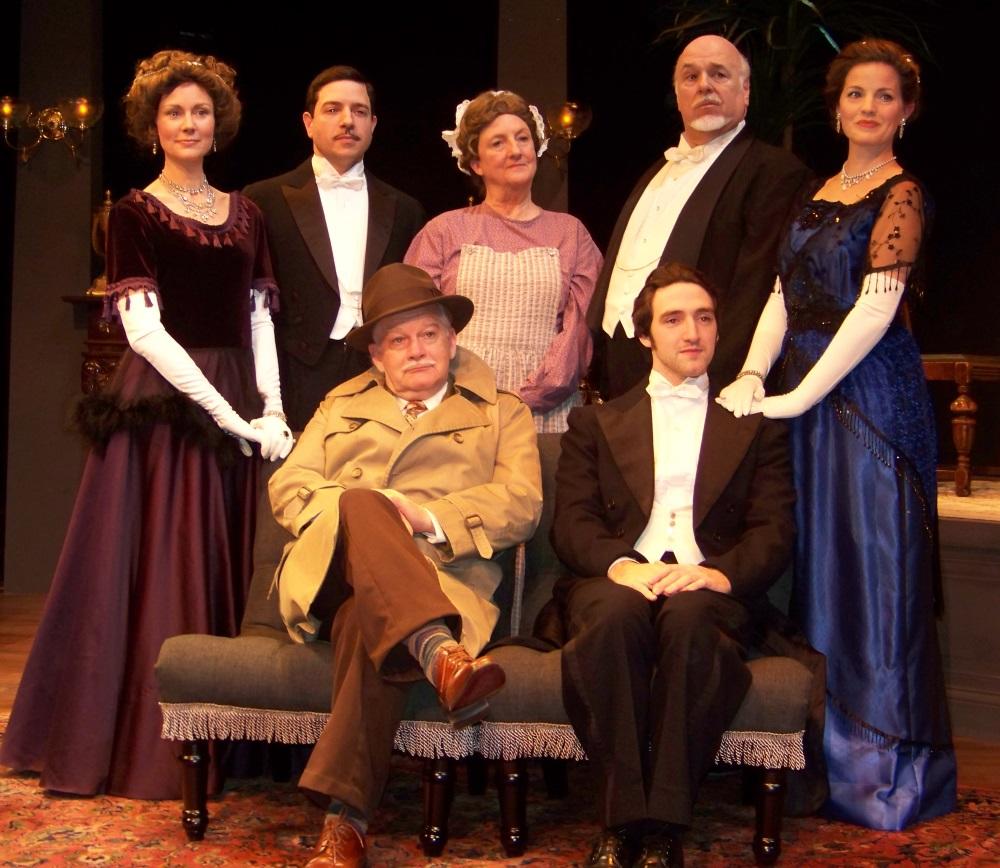An Inspector Calls starts off like a good old-fashioned drawing-room whodunit, proceeds through a roller-coaster of revelations that incriminate just about everyone, and ends with a Twilight Zone-worthy surprise.
J.B. Priestley’s play, written during the Second World War, looks back on the years leading up to the first one. It takes place on a single evening in April 1912. That date, coinciding with the doomed maiden voyage of the Titanic, is not coincidental, for the play is a meditation on overweening pride and the imminent end of an era and a way of life.
The Titanic disaster also provided the opening moment of the Downton Abbey saga, and it’s probably no coincidence that the Majestic Theater has programmed this period piece to coincide with that TV blockbuster’s final season. Like Downton, the play explores the gulf between the well-to-do and the workers whose labor supports their comfort. But here, noblesse does not oblige.
The Inspector’s arrival interrupts a dinner party celebrating the engagement of Sheila, daughter of industrial tycoon Arthur Birling, to the son of his chief rival — a kind of dynastic power play. Inspector Goole (as in “ghoul,” a foreshadowing of Priestley’s surreal outcome) announces that a young working-class woman has just killed herself. Every member of the family has apparently contributed to her death, from depriving her of employment to defiling her chastity.
The play is self-consciously metaphorical, even metaphysical. It’s a family portrait of the class divide and the Victorian certainties that were about to be rocked by the world war and the rise of a militant working class. Interestingly, it was first produced in Russia, a year before its 1946 London premiere, thanks no doubt to the author’s critique of the class system and heartless capitalism.
Seventy years on, its heavy-handed moralizing and stilted dialogue seem a bit musty. The British revival that surprised Broadway in 1994 blew the dust off with a postmodern staging in which the inspector’s interrogations took place in a desolate cityscape and the Birling mansion literally toppled to the ground under the weight of the family’s guilt and hypocrisy.
Zora Kachadurian’s production at the Majestic Theater takes no such liberties. Greg Trochlil’s set is solidly realistic, save for four steel pillars reaching upward like factory smokestacks, and Dawn McKay has outfitted the Birling family circle in high-Edwardian fashion – the men in dinner jackets and pomade, the women in Empire gowns and piled coiffures. The only departure from dramatic naturalism happens on two key entrances and at the very end, when, with a nod to 1940s cinema, Daniel D. Rist’s lighting suddenly shifts into shadowy noir punctuated by movie-thriller music.
There’s one more stylized divergence here, and that’s John Thomas Waite’s performance as the Inspector. While his fellow players act their roles with appropriately stiff upper lips (and often shaky English accents), Waite’s character gives every accusation a melodramatic underline.
Walter Mantani is the harrumphing patriarch, quick to take offense at the Inspector’s impertinent interrogations. As his haughty wife, Cate Damon is just as chilly and impenetrable as the Titanic’s iceberg. Myka Plunkett skillfully carries the play’s moral arc, as daughter Sheila moves from careless coquette to remorseful ally. Josiah Durham’s sloppy-drunk turn as the wastrel son is matched by Gio Castellano’s stiff reserve as the hopeful fiancé.
There’s one more character: Edna, the Birlings’ maid, who does nothing but clear the table and answer the door, but who is the play’s only visible representative of the working classes who are the playwright’s real concern. It’s a shame that Ginger Carson’s mostly silent upstage presence isn’t better employed, to contrast with and comment on the family’s self-satisfied, self-destructive complacency.
Through Feb. 14, Majestic Theater, 131 Elm St., West Springfield, (413) 747-7797, majestictheater.com.
Chris Rohmann is at StageStruck@crocker.com and valleyadvocate.com/author/chris-rohmann



